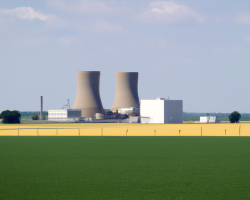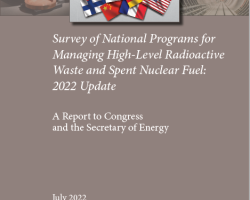Category of Content
Siting Experience Documents Only
Publication Date
Subject Matter
Thermodynamic Database for Generic Disposal System Assessment
Thermodynamic Database for Generic Disposal System Assessment
Modeling Coupled THM Processes and Brine Migration in Salt at High Temperatures
Modeling Coupled THM Processes and Brine Migration in Salt at High Temperatures
Thermo-Hydrological and Chemical (THC) Modeling to Support Field Test Design
Thermo-Hydrological and Chemical (THC) Modeling to Support Field Test Design
Dual-Purpose Canister Filling Demonstration Project Progress Report
Dual-Purpose Canister Filling Demonstration Project Progress Report
Natural system evaluation FY11 year-end report
Natural system evaluation FY11 year-end report
Experimental and Modeling Investigation of Radionuclide Interaction and Transport in Representative Geologic Media
Experimental and Modeling Investigation of Radionuclide Interaction and Transport in Representative Geologic Media
Public Preferences Related to Consent-Based Siting of Radioactive Waste Management Facilities for Storage and Disposal: Analyzing Variations over Time, Events, and Program Designs ?
Public Preferences Related to Consent-Based Siting of Radioactive Waste Management Facilities for Storage and Disposal: Analyzing Variations over Time, Events, and Program Designs ?
Public Views about Storage and Disposal Options for Spent Nuclear Fuel. Energy and Environment Survey, 2017
Public Views about Storage and Disposal Options for Spent Nuclear Fuel. Energy and Environment Survey, 2017
Coupled Thermal-Hydrological-Mechanical Processes in Salt
Coupled Thermal-Hydrological-Mechanical Processes in Salt
Advances in 3D Geologic Modeling of Alluvial Basins with a Focus on Facies and Property Modeling
Advances in 3D Geologic Modeling of Alluvial Basins with a Focus on Facies and Property Modeling
Thermodynamic Properties of Brines, Minerals and Corrosion Products
Thermodynamic Properties of Brines, Minerals and Corrosion Products
Using Environmental Tracers to Estimate Fracture Network Properties
Using Environmental Tracers to Estimate Fracture Network Properties
THERMODYNAMIC DATABASE DEVELOPMENT, WITH EMPHASIS ON COMPLEX CLAY MINERALS
THERMODYNAMIC DATABASE DEVELOPMENT, WITH EMPHASIS ON COMPLEX CLAY MINERALS
THM Coupled Process Modeling with TOUGH-FLAC to Evaluate the Fate and Transport of Water in
THM Coupled Process Modeling with TOUGH-FLAC to Evaluate the Fate and Transport of Water in
LANL Activities in Model Benchmarking and Thermal Test Design Calculations
LANL Activities in Model Benchmarking and Thermal Test Design Calculations
Advanced Parameter Uncertainty Quantification Using Null Space Latin Hypercube Sampling: Application to Uranium and Neptunium Transport Experiments
Advanced Parameter Uncertainty Quantification Using Null Space Latin Hypercube Sampling: Application to Uranium and Neptunium Transport Experiments
GOTHIC Aerosol Source Depletion Studies
GOTHIC Aerosol Source Depletion Studies
DESIGNING A CONSENT-BASED SITING PROCESS: SUMMARY OF PUBLIC INPUT REPORT. Final Draft
DESIGNING A CONSENT-BASED SITING PROCESS: SUMMARY OF PUBLIC INPUT REPORT. Final Draft
Intergenerational Ethical Issues and Communication Related to High-Level Nuclear Waste Repositories
Intergenerational Ethical Issues and Communication Related to High-Level Nuclear Waste Repositories
Purpose of Review: The nuclear power industry started in the 1950s and has now reached a phase of disposing high-level nuclear waste. Since the 1980s, the United Nations has developed a concept of sustainable development and governments have accordingly made ethical commitments to take responsibility towards future generations. The purpose of this review is to examine ethical dilemmas related to high-level nuclear waste disposal in a long-term perspective including potential access to the waste in the future.
Science based responses to social myths on nuclear energy
Science based responses to social myths on nuclear energy
In order to promote a sound basis for considering the role of nuclear in climate change, this review spans the technical topics of social and political debate surrounding nuclear energy with a focus on the objective science of these issues including nuclear waste, accidents and overall risk. Novel aspects include the emergence of nuclear energy as being potentially renewable and the antithesis of Fukushima being an argument for the unacceptable risks associated with the use of nuclear energy.
Survey of National Programs for Managing High-Level Radioactive Waste and Spent Nuclear Fuel: 2022 Update
Survey of National Programs for Managing High-Level Radioactive Waste and Spent Nuclear Fuel: 2022 Update
In October 2009, the U.S. Nuclear Waste Technical Review Board (Board or NWTRB) published Survey of National Programs for Managing High-Level Radioactive Waste and Spent Nuclear Fuel. For each of the 13 national programs studied, the report catalogued 15 institutional arrangements that had been set in place and 15 technical approaches that had been taken to design repository systems for the long-term management of high-activity radioactive waste.


